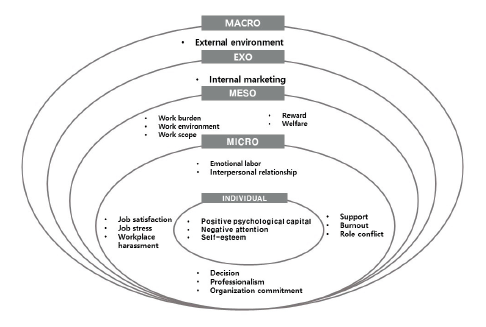Abstract
Objectives: A systematic review and a meta-analysis were performed investigate the factors related to turnover intention of dental hygienists in Korea. Methods: Literature between 2000 and January 2021 were used to support the meta-analysis, which focused on 21 factors extracted from 50 articles using a random effects model. The correlation coefficient, r, in the effect size was calculated. Results: Substantial literature was published after 2011 (76%); in academic journals (74%); and targeted non-metropolitan areas (40%). Lawler’s turnover intention tool was used in several studies. The effect size for each ecosystem was in the order of microsystem (r=0.325), mesosystem (r=0.307), macrosystem (r=0.259), exosystem (r=0.176), and individuals (r=0.171). The random-effects model indicated an overall average of r=0.311. The factor that showed a large effect size in relation to turnover intention was organizational commitment of the microsystem (r=-0.594). Furthermore, mesosystem reward (r=-0.416), microsystem burnout (r=0.464), job stress (r=0.408), and job satisfaction (r=-0.405) were identified as other major factors. Conclusions: To lower the turnover rate of dental hygienists, it is important to focus on factors belonging to the microsystem, and mesosystem reward.
Figures & Tables

Fig. 1. Study model using ecolo gica l systems theory


